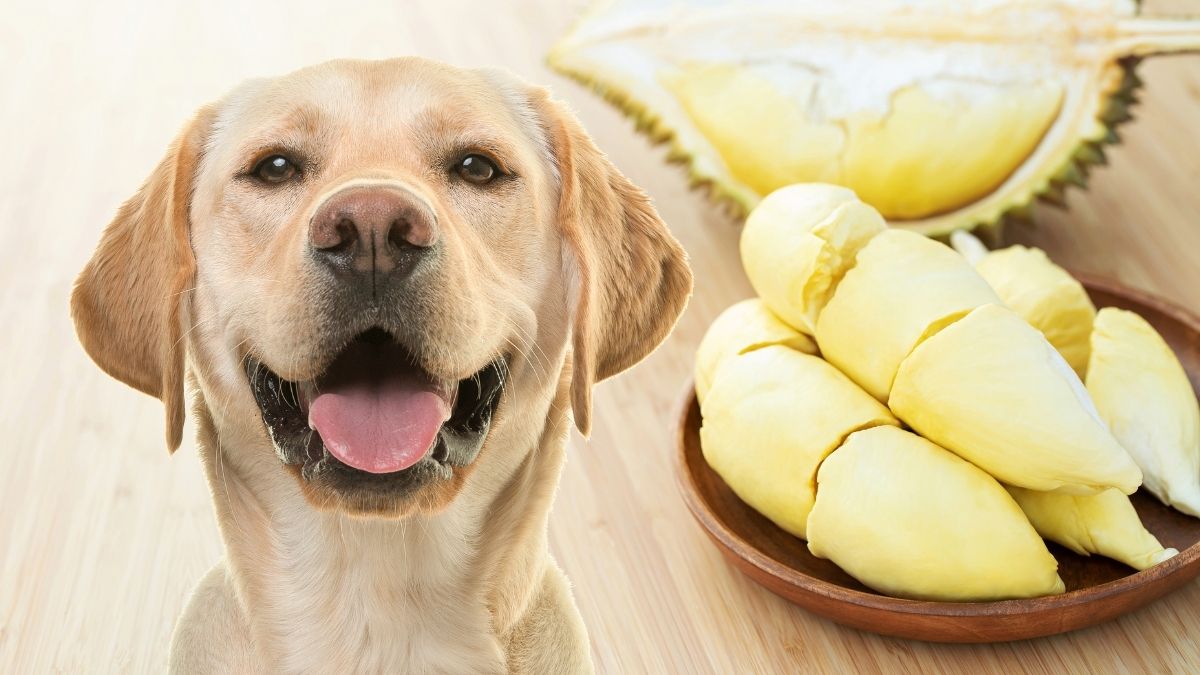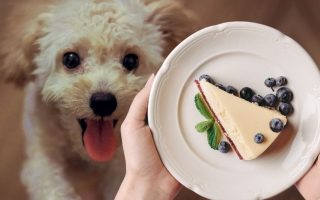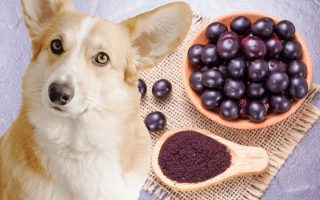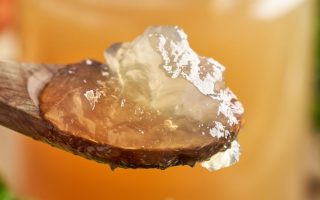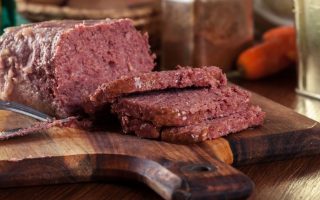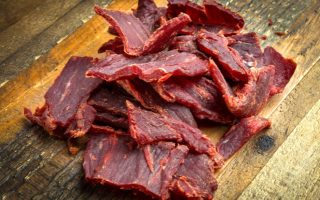Too often, dogs are perceived to be carnivores; rather, they are omnivores like humans and, as such, can eat both a meat-based diet and a plant-based diet.
The latter is responsible for providing carbohydrate and dietary fiber, while the aforementioned provides protein and fat for growth.
Yet despite the fact dogs can eat plant-based meals, this doesn’t necessarily mean all plants or fruit are safe for their consumption.
As a loving dog parent, you must know what fruit is and isn’t safe for them.
What about dogs and durian? Can dogs eat durian fruit? This article explores everything you need to know about this uncommon fruit and if durian is good for dogs.
What is Durian?
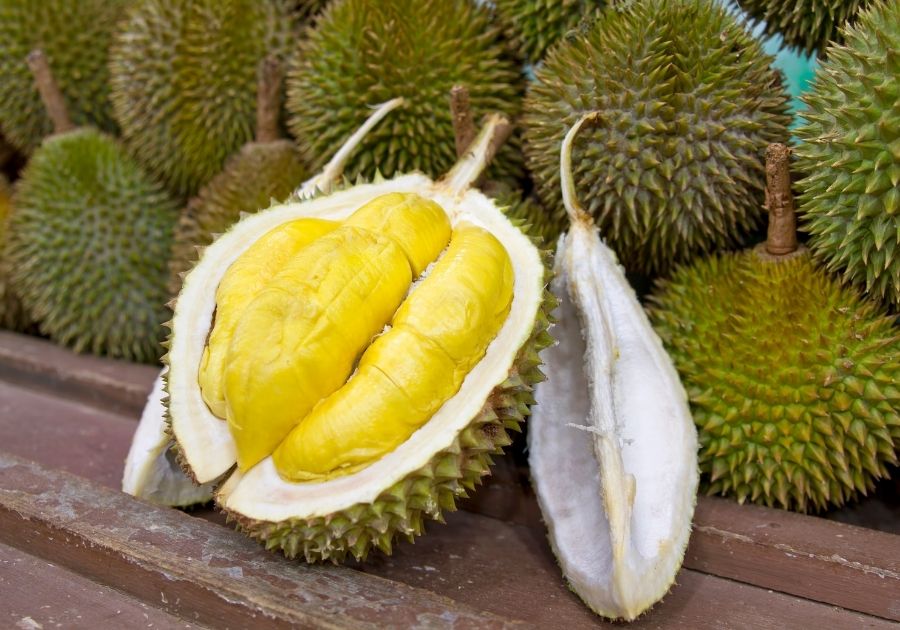
Also known as the “king of fruits,” durian is an edible fruit of several tree species belonging to the genus Durio.
It is large in size, about 12 inches long and 16 inches in diameter, with a spiky and hard outer shell and oblong in shape.
It is anything from a pale yellow to red on the inside, all depending on the species.
This tropical fruit, which weighs an average of 5 pounds, is native in countries such as the Philippines, Malaysia, Thailand, Singapore, Indonesia, and other Asian countries.
It has a non-conclusive smell, with some regarding its smell as pleasant while others find the smell to be disgusting and unpleasant.
Can Dogs Eat Durian Fruit?
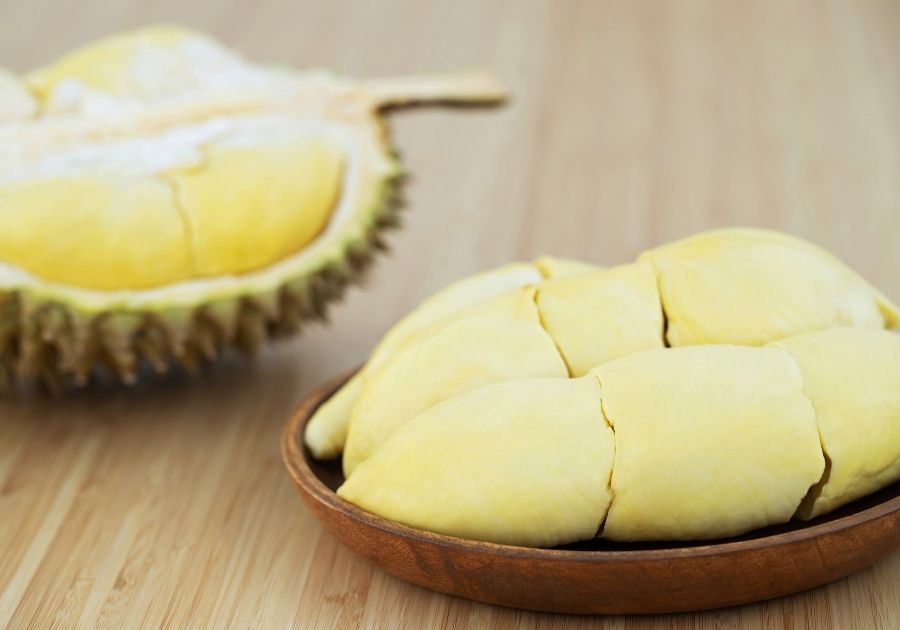
The straightforward answer is yes, dogs can eat durian, but it is critical to be mindful of the part of this fruit you choose to feed or not feed to your pet.
Durian is a highly nutritious fruit and, if fed right to dogs, offers several benefits to their health.
However, if fed wrong, especially the seed, it could be dangerous to a dog’s health.
Durian flesh in itself isn’t toxic to dogs, and several dogs can eat this part without any ill health consequences or allergic reactions, but certain parts of the fruit are toxic.
Below is the nutrient profile for portion size (243g) of durian:
| Nutrition Facts | Amount |
|---|---|
| Calories | 357 |
| Fat | 13g |
| Sodium | 4.9mg |
| Potassium | 1059mg |
| Carbohydrates | 66g |
| Fiber | 9.2g |
| Protein | 3.6g |
| Vitamin A | 2.1% |
| Vitamin C | 80% |
| Calcium | 15mg |
| Iron | 1mg |
Health Benefits: Is Durian Good for Dogs?
As noted earlier, durian is a highly nutritious fruit and unsurprisingly offers many health benefits to canine health.
Below are some of the ways durian fruit positively impacts a dog’s health.
1. Improves Digestion
According to research by the Asian Institute of Medical Science and Technology, Malaysia, durian aids and improves digestion’s overall process.
This is expected, seeing as this fruit contains a significant amount of dietary fiber, a chemical substance vital to the functioning of the digestive system.
Dogs that may be suffering from bloating, cramps, and constipation will undoubtedly benefit from eating durian.
2. Promote healthy bones
Magnesium, Manganese, Potassium, and Copper are some minerals necessary for developing and maintaining healthy bones in dogs.
These minerals also prevent bone diseases and disorders such as osteoporosis development. Fortunately, durian contains essential nutrients that support healthy bones.
3. Red blood cell
Red blood cells are vital in transporting oxygen around the body.
Durian is rich in folic acid as well as a significant level of iron and copper which plays a significant role in the production of RBC in dogs.
Consistent RBC production is vital to any animal to avoid anemia, and durian is filled with the necessary mineral responsible for RBC production.
Health Concerns of Feeding Durian to Dogs
Although durian is a safe fruit for your furry companion, there are few things for dog parents to be enlightened about before feeding this fruit to their pet dogs.
Spiky outer rind
The spiky hard rind of durian should not be fed to dogs. It has pointed spikes all over and is hard to chew.
It is a potential choking hazard to dogs. Dogs do not possess logical thinking and thus could eat up the whole fruit.
It is the responsibility of dog parents to keep unsafe food away from dogs.
Seed
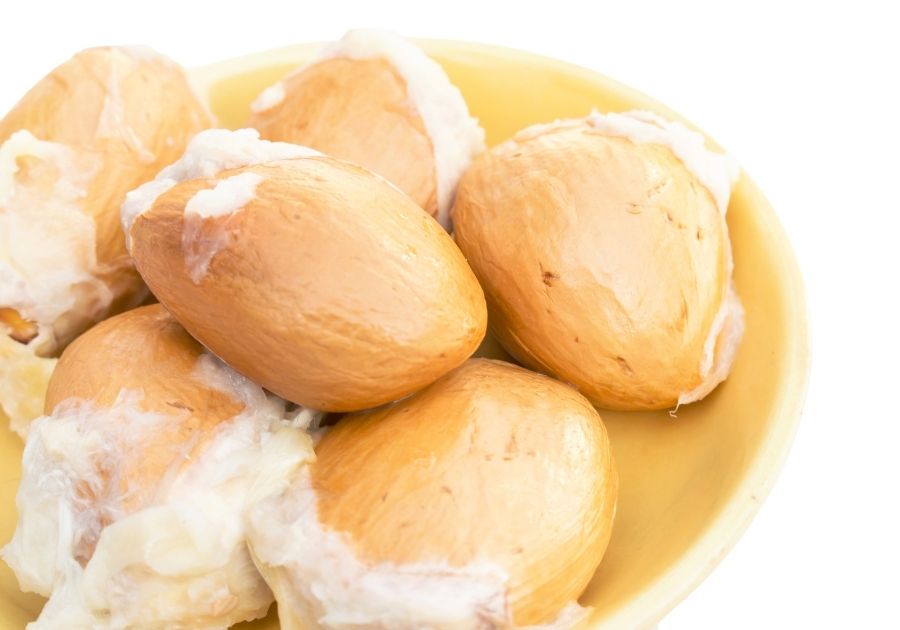
Generally, most fruit seeds are unsafe for dog consumption, and durian is no different. The seed contains a potent chemical known as cyanide.
Cyanide can cause severe damage to dogs’ hearts and brains and could lead to death in extreme situations.
Stem and leaves
The stem and leaves of the durian tree are also not something dogs can eat. They are a cause of choking hazards and may obstruct the digestive tract.
Sugar
Sugar in whatever form can be bad for dogs when consumed in excess. Durian, as with many other fruits, is rich in natural sugar.
A dog’s overconsumption of durian will lead to diabetes and also result in a rise in blood sugar levels.
Fats
Aside from sugar, durian also contains a significant amount of fat.
Dogs that overindulge in fattening food will suffer from obesity which opens the doors to myriads of other health complications. Therefore, it is vital to feed durian in moderation to dogs.
However, underweight dogs can benefit from more regular durian consumption to gain some pounds; still, this should be done with discretion.
How to Safely Feed Durian to Dogs
When it comes to feeding food to dogs, especially new food, it goes deeper than just serving in a bowl or having them mulching from your hands.
Below is a guideline for safely feeding durian to dogs.
- Firstly, cut open the spiky rind and gently cut out the flesh.
- Remove the seeds and dispose of them where your dogs can’t wander across them. The seed is toxic to dogs. Note if the fruit is attached to a stem or leaf, also dispose of them as well.
- If you follow the first two steps correctly, you’d be left with only the flesh of the fruit. Cuts the flesh into small bite-size to allow your dog to eat them easily.
Feed in small quantities and observe your dog’s reaction. If your dog seems to enjoy the fruit, in the absence of no allergic reaction, then it is safe to feed regularly (i.e., occasionally as a treat)
How Much Durian Can Your Dog Eat?
Considering that durian is high in fat and sugar, it should be fed to dogs moderately.
Also, a study suggests that eating large quantities negatively impacts cardiovascular health as durian can speed up heart rate, which can be fatal.
So, how much durian is safe to feed to dogs?
A general recommendation is that no more than 10% of a dog’s daily calories should come from treats.
This doesn’t necessarily mean the 10% calories should come from only durian fruit but rather a wide range of healthy fruit and snacks.
On this note, it is advisable for dog parents to feed pet dogs a couple of bites in a serving and not more than a few times a week.
Durian fruit is a treat and, as such, should be fed to dogs moderately and occasionally.
Other Varieties
We’ve established that durian is a safe fruit to feed to dogs. However, it may be confusing when it comes to feeding other variants of durian.
Are they also safe for dog consumption? Find out
Dried Durian
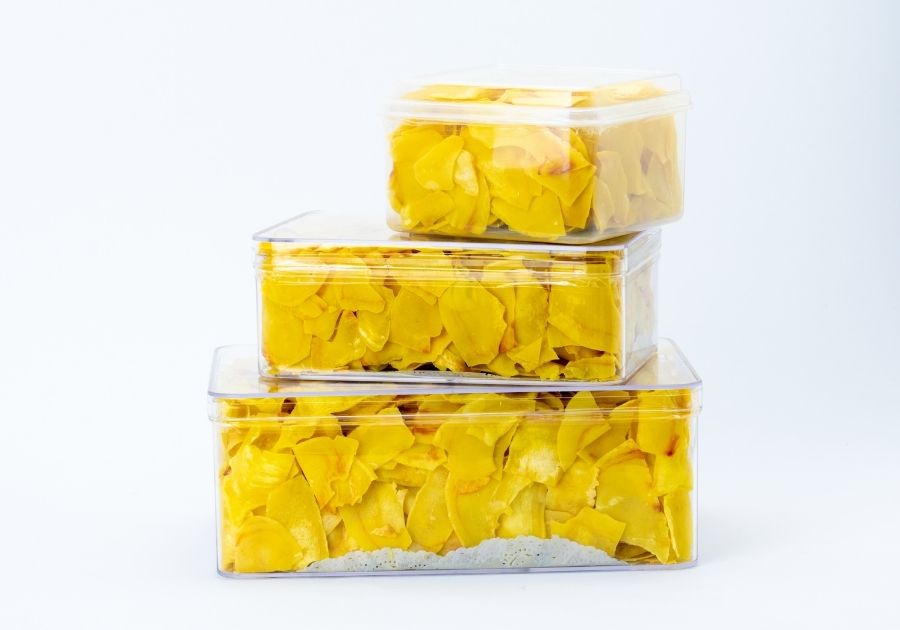
As long as the dried durian you intend to feed your dog isn’t spoilt and you must have removed the seed and rind, it is safe to eat.
Ensure the dried durian has not been treated with pesticides or chemicals. If it has, do not feed such to dogs.
Durian Cake
No dogs shouldn’t eat durian cake as it contains ingredients that will not only disrupt their digestive system but lead to long-term health complications.
Cakes, in general, are not a healthy treat to feed to dogs.
Durian Ice Cream
Durian ice cream is safe for dog consumption in little quantities due to the high amount of sugar it contains.
However, dogs that are lactose intolerant can’t have this.
My Dog Ate Durian Seed – What Can I Do?

As mentioned earlier, the seeds of most fruits are toxic to dogs, and durian is no exception. They contain harmful chemicals known as cyanide.
What should you do if your dog ate the seed or even the leaves or stems of durian fruit? How can you tell they’ve eaten the unsafe parts of this fruit?
If your dog has eaten the seed of durian or any other fruit in large quantity, it will experience cyanide poisoning.
Some of the symptoms of cyanide poisoning include:
- Vomiting and stomach ache
- Dilated pupils
- Shock
- Breathing difficulty
- Convulsions
- Paralysis
In this case, you ought to take such a dog to the vet immediately. Further delay would be fatal to the health of such a dog.
Recommended:
Can Dogs Eat Jicama? The Juicy & Crunchy Facts
FAQs
Do dogs like the smell of durian fruit?
Durian has a strong smell, and dogs have sensitive noses. Hence, they may react to the odor and not want to eat them. Certainly, most dogs don’t like the smell of durian.
What does cyanide do to dogs?
Cyanide poisoning in dogs can be deadly even within a few minutes of consumption. It causes salivation, difficulty in breathing, and even convulsions.
It is advisable to take your dog to a vet if you suspect your dog has eaten a large quantity of the fruit’s seed.
When is durian unhealthy to feed to dogs?
Dogs prone to obesity or diabetes should not be fed durian as this fruit is high in natural sugar and fat.
Wrap Up
In conclusion, durian is a safe fruit to feed to dogs. However, dog parents should do well to feed in small quantities and occasionally without the seeds and rind.
Most dogs may not like the smell of durian. Still, you could mix it with other healthy fruit treats and feed them.
Durian is a highly nutritious fruit that offers a lot of benefits to dogs when fed correctly.
If your dog accidentally consumes the seed of durian or any fruit, do not hesitate to take your dog to the vet.
You May Also Like:
Can Dogs Eat Artichokes? What You Should Know

